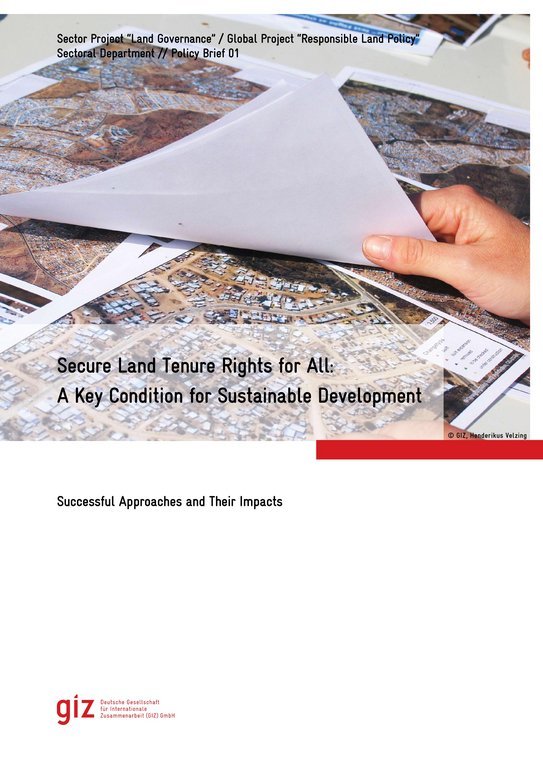 Read this article in French
Read this article in French- Share this article
- Subscribe to our newsletter
Secure Land Tenure Rights for All
The new policy paper “Secure Land Tenure Rights for All: A Key Condition for Sustainable Development - Successful Approaches and Their Impact” published by Deutsche Gesellschaft für Internationale Zusammenarbeit (GIZ), on behalf of the German Federal Ministry for Economic Cooperation and Development (BMZ) in June 2019, presents successful approaches to secure land tenure rights in rural and urban areas.
Increasing evidence points to positive economic, social and environmental effects of improved tenure security. Formal registration can be associated with an increase in agricultural yields, alongside with investments in soil conservation, higher tax revenues of governments, decreased deforestation and can contribute to the stabilization of post-conflict societies.
Women benefit particularly from secure tenure rights
Women, having often only indirect tenure rights allocated by male members of their family, benefit particularly from secure tenure rights, empowered to participate in decision making.
Nevertheless, 70 per cent of the world’s population still have no access to formal land registration systems. Globally, only 30 states have a functioning, countrywide land administration that recognizes local land tenure systems. About 30 per cent of the urban population in developing regions live in slums with a lack of any formal recognition of tenure.
Only a few countries have managed to lower their surveying and registration costs and to set up sustainable registry systems. The political will to engage in deep-rooted reforms remains a basic requirement for successful tenure reforms.
Depending on the legal, cultural and environmental conditions and technical capabilities of a country, it is crucial to find the right land registration approach, ensuring long-term maintenance and financial self-sufficiency. To secure land rights for all, especially for women and vulnerable groups, the various forms of land rights should be recognized and formalized.
This requires increasing the awareness and acceptance among various levels of society, but especially among the implementing authorities. Conflict sensitive and holistic land governance approaches as well as the establishment of legal and institutional frameworks will ensure long-term equity, inclusiveness, transparency, participation, accountability and help to steer the overall development of a country.
To support future programmatic decisions of donor organizations and implementing agencies in the land sector, this policy paper focuses especially on impacts and good practices. It discusses examples from the German technical cooperation but also includes good practices and impacts achieved by other development partners.
Andreas Lange and Felix Schilling, Deutsche Gesellschaft für Internationale Zusammenarbeit (giz) GmbH, Bonn, Germany
For more information, please contact Andreas Lange (andreas.lange@giz.de) and Felix Schilling (felix.schilling@giz.de)
Read more and download the policy paper – in English: “Secure Land Tenure Rights for All: A Key Condition for Sustainable Development - Successful Approaches and Their Impact”





Add a comment
Be the First to Comment